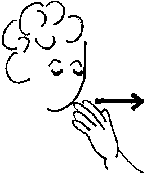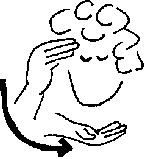Magic Words
I was double-booked this morning.
I had a meeting. I was sort of in charge of it. I had also been asked to speak at another meeting in the afternoon, but late in the week the time was changed, so there was a conflict. Not really a big deal; these weren't highfalutin' powerbroker meetings or anything. I just called someone who was going to be at the first meeting, and asked her if she would wrap it up for me because I would have to leave early. She said yes, and the problem was solved.

As I left the first meeting, I wanted her to know I was grateful that she was taking care of things for me. So I mouthed the words 'thank you' as I left. As I did that, I also put my hand to my lips, and then extended them to her, palm up. In American Sign Language, this also means 'Thank you.' I really hadn't meant to do it; I don't really know ASL, except for a few basic gestures.

I live in a city with a higher than average deaf population. There's both a high school and a college for the deaf in the area, so ASL is somewhat common. Even though she was not deaf, she knew at least as much as I did, and probably more. She responded with the gesture for 'You're Welcome. Her hand went from her forehead to palm-up below her chin.
Really, very beautiful gestures. I feel like they really convey the meaning of the two phrases quite well. It felt good to do it, and to see the response.
This got me thinking about the phrases. Not many people give thanks anymore. You stop to let someone in front of you, they just move in like it's their right.
I always try to give thanks where thanks is due. I feel it's important to let people know that I appreciate their effort.
And surprisingly few ever say 'You're welcome.'
They'll say 'No problem,' 'Don't worry about it,' or 'Forget about it.'
They may think that it's the same as 'you're welcome,' but to me, it isn't.
Often times there's not a problem, I wasn't worrying, or I don't want to forget.
I can somewhat understand why some folks don't give thanks, but why the reluctance to receive and acknowledge the thanks?
Is it some social fear? Do they think that if they don't acknowledge that they did something, then they'll have me in their debt? If they do, too bad. I said my thanks. Whether you accept it or not is up to you.
I may not be online much next week. I'm heading across the state with the kids to visit my brother. I don't know how much time I'll be online. I may post a few comments on your blogs, but I doubt I'll have enough time to post.
Thank you for visiting my blog, and letting me get to know all of you, if only a little bit.
Yeharr
I had a meeting. I was sort of in charge of it. I had also been asked to speak at another meeting in the afternoon, but late in the week the time was changed, so there was a conflict. Not really a big deal; these weren't highfalutin' powerbroker meetings or anything. I just called someone who was going to be at the first meeting, and asked her if she would wrap it up for me because I would have to leave early. She said yes, and the problem was solved.

As I left the first meeting, I wanted her to know I was grateful that she was taking care of things for me. So I mouthed the words 'thank you' as I left. As I did that, I also put my hand to my lips, and then extended them to her, palm up. In American Sign Language, this also means 'Thank you.' I really hadn't meant to do it; I don't really know ASL, except for a few basic gestures.

I live in a city with a higher than average deaf population. There's both a high school and a college for the deaf in the area, so ASL is somewhat common. Even though she was not deaf, she knew at least as much as I did, and probably more. She responded with the gesture for 'You're Welcome. Her hand went from her forehead to palm-up below her chin.
Really, very beautiful gestures. I feel like they really convey the meaning of the two phrases quite well. It felt good to do it, and to see the response.
This got me thinking about the phrases. Not many people give thanks anymore. You stop to let someone in front of you, they just move in like it's their right.
I always try to give thanks where thanks is due. I feel it's important to let people know that I appreciate their effort.
And surprisingly few ever say 'You're welcome.'
They'll say 'No problem,' 'Don't worry about it,' or 'Forget about it.'
They may think that it's the same as 'you're welcome,' but to me, it isn't.
Often times there's not a problem, I wasn't worrying, or I don't want to forget.
I can somewhat understand why some folks don't give thanks, but why the reluctance to receive and acknowledge the thanks?
Is it some social fear? Do they think that if they don't acknowledge that they did something, then they'll have me in their debt? If they do, too bad. I said my thanks. Whether you accept it or not is up to you.
I may not be online much next week. I'm heading across the state with the kids to visit my brother. I don't know how much time I'll be online. I may post a few comments on your blogs, but I doubt I'll have enough time to post.
Thank you for visiting my blog, and letting me get to know all of you, if only a little bit.
Yeharr


12 Comments:
You are welcome!
And being a non US citizen, I thought that by saying "no problem" instead of "you're welcome" you where indicating that it really was no effort and you don't have to say thanks (even though it's appreciated). I thought "you're welcome" was something you said when the person SHOULD say "thank you". Like it’s more polite/modest to say “no problem”. Does this make sense? Not sure if I'm expressing myself correct here actually. Nice to get the sign language lesson!
Safe travels! *S*
I had not considered the "you are welcome" comment much. I hardly use it either. I usually say "Glad to help"
I do take the "no problem" etc comments the same way Asa does, as a modest way of acknowledging the appreciation. It does seem as the language evolves, we lose some of the beauty of many genteel expressions
You're welcome and it is always my pleasure to visit your blog.
Thank you BP, you are a good man.
have a safe trip.
yehar.
just wanted to say that...
I like the attitude of welcoming. Saying 'you're welcome' conveys a sense of conviviality and hospitality that is missing in the rather dismissive 'no problem.'
'Glad to help,' or 'My pleasure' work as well, I guess.
But there's something about the act of welcoming that appeals to me.
I let the kids stay up late last night and fall asleep in the living room watching TV; I woke them at 6, and they slept through more than half of the three-hour drive here.
They (and I) have been relaxing and swimming in my brother's pool for most of the day, so they're probably going to sleep quite well tonight, too.
You can yehar me anytime, ell.
Yeharr
I took two semesters of Sign Language in college. I plan on teaching it to my son, though not necessarily with the "baby sign" thing. As an english teacher, I can't be sure that helps with language aquisition as not enough research has been done.
Have fun!
Have a nice trip!
I've taught my kids to say "You're Welcome", but sadly I don't always use it myself.
americans are very odd people. very distant, i think. i come from a culture where we kiss hello and goodbye, we say good morning, good afternoon, and good night to perfect strangers, please and thank you. i think it isn't that americans are cold, i think that it is just a different culture, one that is fast paced and a little preoccupied.
be careful though...an idiot would think the sign for thank you is blowing a kiss and that opens the door to sexual harrassment
and you, papi, are welcome
Huh, I'd always thought "thank you" began by touching your chin, not your lips.
I'm all about social courtesies; blame it on my mother who dropped me off at every childhood event with the words "Don't forget to say please and thank you!" So thanks for thanking us.
hope you are having a good time BP. Thank YOU for all your wise words over the last year or so.
Post a Comment
<< Home